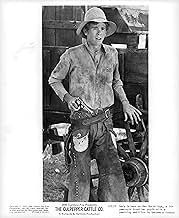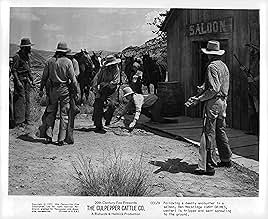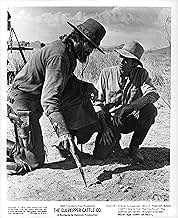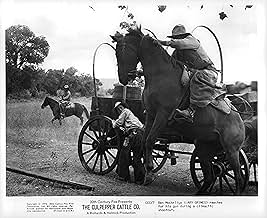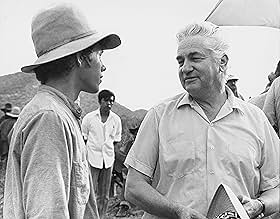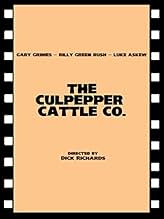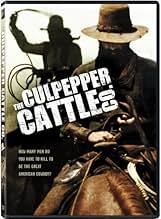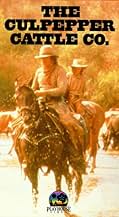PUNTUACIÓN EN IMDb
6,9/10
2 mil
TU PUNTUACIÓN
El joven granjero que siempre quiso ser un vaquero habla con un duro jefe de caminos para que lo contrate en un paseo de ganado.El joven granjero que siempre quiso ser un vaquero habla con un duro jefe de caminos para que lo contrate en un paseo de ganado.El joven granjero que siempre quiso ser un vaquero habla con un duro jefe de caminos para que lo contrate en un paseo de ganado.
- Dirección
- Guión
- Reparto principal
- Premios
- 2 nominaciones en total
Billy Green Bush
- Frank Culpepper
- (as Billy 'Green' Bush)
Charles Martin Smith
- Tim Slater
- (as Charlie Martin Smith)
Reseñas destacadas
Surely one of the best westerns of all-time, & has to be THE most authentic western ever made, I cannot think of another to match it. Carefully crafted screenplay, told it how it really was, the characters brilliantly played by everyone involved. But it's authenticity is what makes it so fascinating a film to watch, it literally transports you back in time, a real history lesson. Some great iconic one liners, 'Don't stand behind me, boy!' & 'Why put a name to something you might have to eat!?' Geoffrey Lewis, Billy Green Bush & Gary Grimes were riveting in their portrayals. Lewis's hard-man character, so sinister, you really did think, 'This guy is a psycho!!' Bush played the trail weary boss with such attitude it made you acutely aware the hardships & dangers these men faced for so little reward. Grime's naive young character was played to perfection. A great piece of American history, & I have to say, the violence is not overdone, nor is there too much of it, compared to many other western films. If this film is not stored somewhere in a State Library, well, it should be!
10TonyMan
I feel this is possibly the best Western I have ever seen. It portrays gritty people with simple outlooks to life. I believe this must truly show what the west was like - simple, rough, dirty, bad fitting clothes, etc. I was raised on Disney movies and when you compare this to them you get a real feel for what happens when a kid decides to chase a dream in the world of adults. My favorite line is when the kid tells one of the cowboys that being a cowboy is the greatest job in the world. The guy responds, " Kid, being a cowboy is what you do when you can't do anything else".
I suggest this as required viewing for anyone with an interest in the Old West.
I suggest this as required viewing for anyone with an interest in the Old West.
Had I seen "The Culpepper Cattle Company" when it was released (I was 23), my life would have been a lot different; at least, if I'd understood and accepted the message. For, "The Culpepper Cattle Company" is about as bleak and realistic as any movie ever made. Gary Grimes plays a teenager with romantic, adventuresome ideas about cowboys. He learns, tragically, something completely different, after working for a short time on a cattle drive. Grimes doesn't just learn the usual lessons; that is, the work is exhausting, dirty, always dangerous and frequently unrewarding. He learns that most causes and people are treacherous, deceitful, selfish and certainly not worth dieing or killing for. Grimes also learns a lot about himself; some of which he probably didn't want to know.
There are a lot of fine performances in "The Culpepper Cattle Company," but Geoffrey Lewis makes the strongest impression. Lewis has such crazy blue eyes, it's no surprising producer Sergio Leone tapped him for head villain in "My name is Nobody" and Eastwood did the same for "High Plains Drifter." Here, Lewis plays a man who, under different circumstances, was probably quite decent. Now, he's just mean spirited and dangerous.
"The Culpepper Cattle Company" also boasts excellent production design, gritty photography and classic, memorable score by the beloved Jerry Goldsmith. Just don't expect to leave this movie feeling upbeat, inspired or even sad. You're more likely to feel slightly depressed. That being said, I give "The Culpepper Cattle Company" an "8".
There are a lot of fine performances in "The Culpepper Cattle Company," but Geoffrey Lewis makes the strongest impression. Lewis has such crazy blue eyes, it's no surprising producer Sergio Leone tapped him for head villain in "My name is Nobody" and Eastwood did the same for "High Plains Drifter." Here, Lewis plays a man who, under different circumstances, was probably quite decent. Now, he's just mean spirited and dangerous.
"The Culpepper Cattle Company" also boasts excellent production design, gritty photography and classic, memorable score by the beloved Jerry Goldsmith. Just don't expect to leave this movie feeling upbeat, inspired or even sad. You're more likely to feel slightly depressed. That being said, I give "The Culpepper Cattle Company" an "8".
Although a small movie, "The Culpepper Cattle Company" is arguably one of the top ten westerns of all time. It takes a fairly basic but relevant coming of age story and sets it in the American West. But the "been there-done that" stuff gives way to something that has extremely heavy Peckinpah influences. Like "The Wild Bunch" (and Bo Hopkins gets to reprise his Clarence "Crazy" Lee role) this becomes a violent anti-violence film with blurred lines between "good guy" and "bad guy". As with Peckinpah's "Straw Dogs", moral ambiguity is the theme and it is not until near the end that the four drovers, pressed to finally take a moral stand, redeem themselves with a final act of personal responsibility.
In addition to a good characterization from Hopkins, Geoffry Lewis plays the wrapped a little too tight "Russ" with an over-the-top Gary Oldman-like flare, and Luke Askew does a masterful job as the drover who provides early clues that these are four guys who have had to subordinate their basic goodness in order to survive in this environment. Billy Green Bush plays "Frank Culpepper" who remains focused on business to the exclusion of any lost causes. Bush played the likable "Elton" in "Five Easy Pieces" who was responsible for the classic Nicholson line: "don't tell me about the good life Elton, the good life makes me want to puke".
Also exceptional is the cinematography and the production design. Back in the ancient 1970's, only the high budget pictures had production designers. The others had to rely on the cinematographer to make sure the art director, the set designer, and the make-up/costume people were all on the same page; so that the picture had a consistent look. Ralph Woolsey was one of the better cinematographers at keeping all these elements under control.
It became popular after Robert Altman's "McCabe and Mrs. Miller" (1971) to replace the well-scrubbed Roy Rogers look and portray the west as dirty, dusty, gritty, unshaven, and tattered. Woolsey eagerly embraced this realism in 1972 and gave us two of the grimiest features we are likely to see; the excellent "Culpepper Cattle Company" and the somewhat lame "Dirty Little Billy".
The shootout scene in the saloon (midway into the film) is more climatic than the final scene. Not until "The Unforgiven" has there been so much action-so fast-on such a tiny set; yet Woolsey captured it all and the post-production people assembled it into a neat and logically sequenced package. So you can follow the whole thing with very little confusion.
In addition to a good characterization from Hopkins, Geoffry Lewis plays the wrapped a little too tight "Russ" with an over-the-top Gary Oldman-like flare, and Luke Askew does a masterful job as the drover who provides early clues that these are four guys who have had to subordinate their basic goodness in order to survive in this environment. Billy Green Bush plays "Frank Culpepper" who remains focused on business to the exclusion of any lost causes. Bush played the likable "Elton" in "Five Easy Pieces" who was responsible for the classic Nicholson line: "don't tell me about the good life Elton, the good life makes me want to puke".
Also exceptional is the cinematography and the production design. Back in the ancient 1970's, only the high budget pictures had production designers. The others had to rely on the cinematographer to make sure the art director, the set designer, and the make-up/costume people were all on the same page; so that the picture had a consistent look. Ralph Woolsey was one of the better cinematographers at keeping all these elements under control.
It became popular after Robert Altman's "McCabe and Mrs. Miller" (1971) to replace the well-scrubbed Roy Rogers look and portray the west as dirty, dusty, gritty, unshaven, and tattered. Woolsey eagerly embraced this realism in 1972 and gave us two of the grimiest features we are likely to see; the excellent "Culpepper Cattle Company" and the somewhat lame "Dirty Little Billy".
The shootout scene in the saloon (midway into the film) is more climatic than the final scene. Not until "The Unforgiven" has there been so much action-so fast-on such a tiny set; yet Woolsey captured it all and the post-production people assembled it into a neat and logically sequenced package. So you can follow the whole thing with very little confusion.
"The Culpepper Cattle Co." is a good, solid coming-of-age story set in the Old West, done in the gritty post-Peckinpah style that lets us know that the characters in this tale are leading hard lives. It also becomes a tale of redemption as men neither "good" nor "bad" finally decide to take a stand and do something honourable. Director Dick Richards ("Farewell, My Lovely"), who also gets story credit, gets excellent performances out of a cast that includes many top character actors. Some viewers may not be able to stomach how violent things eventually get, but there are many fine moments along the way. There's no filler here, just simple and effective story telling, enhanced by the work of two credited cinematographers (Ralph Woolsey and Lawrence Edward Williams) and two credited composers (Tom Scott and the legendary Jerry Goldsmith).
Gary Grimes of "Summer of '42" fame stars as Ben Mockridge, who more than anything yearns to be a cowboy and gets the chance to work on a cattle drive supervised by tough, business-oriented Frank Culpepper (Billy Green Bush, "Five Easy Pieces"). As Culpepper and his company press on, they must deal with a cattle rustler (Royal Dano), a horse thief (Gregory Sierra), a trapper (Paul Harper), and personality conflicts, with hot tempered Russ Caldwell (an effectively wired Geoffrey Lewis) making trouble on more than one occasion. The biggest obstacle will turn out to be miserly land owner Thorton Pierce (a memorably hateful John McLiam), who's not inclined to be very understanding.
Ben's journey to becoming a man is a reasonably compelling one, and Grimes is fine in the role, but the show is stolen by his older co-stars. Also among them are Luke Askew ("Cool Hand Luke"), Bo Hopkins ("The Wild Bunch"), Wayne Sutherlin ("The Great Northfield Minnesota Raid"), and Matt Clark and Anthony James from "In the Heat of the Night". Also look for appearances by Charles Martin Smith, Hal Needham, Arthur Malet, and Dennis Fimple.
Well done overall, with some very sobering sequences and the occasional comedic touch; the action is intense and the violence, admittedly, is fairly shocking. It's enjoyable stuff deserving of a rediscovery.
Seven out of 10.
Gary Grimes of "Summer of '42" fame stars as Ben Mockridge, who more than anything yearns to be a cowboy and gets the chance to work on a cattle drive supervised by tough, business-oriented Frank Culpepper (Billy Green Bush, "Five Easy Pieces"). As Culpepper and his company press on, they must deal with a cattle rustler (Royal Dano), a horse thief (Gregory Sierra), a trapper (Paul Harper), and personality conflicts, with hot tempered Russ Caldwell (an effectively wired Geoffrey Lewis) making trouble on more than one occasion. The biggest obstacle will turn out to be miserly land owner Thorton Pierce (a memorably hateful John McLiam), who's not inclined to be very understanding.
Ben's journey to becoming a man is a reasonably compelling one, and Grimes is fine in the role, but the show is stolen by his older co-stars. Also among them are Luke Askew ("Cool Hand Luke"), Bo Hopkins ("The Wild Bunch"), Wayne Sutherlin ("The Great Northfield Minnesota Raid"), and Matt Clark and Anthony James from "In the Heat of the Night". Also look for appearances by Charles Martin Smith, Hal Needham, Arthur Malet, and Dennis Fimple.
Well done overall, with some very sobering sequences and the occasional comedic touch; the action is intense and the violence, admittedly, is fairly shocking. It's enjoyable stuff deserving of a rediscovery.
Seven out of 10.
¿Sabías que...?
- CuriosidadesThe pistol Ben (Gary Grimes) shows off to Tim (Charles Martin Smith) at the beginning of the movie and later kills his first man with during the saloon shootout, is a model 1858 Remington Army.
- PifiasImmediately after starting the drive, the cook needs to spit, and does so across Ben, who is sitting beside him. The cook then tells Ben that he better "Sit down wind." This is wrong, because Ben should sit Up Wind. You never spit Into-The-Wind, you always spit With-The-Wind or Down Wind. The line should have been, "You better NOT sit down wind."
- Citas
Cook, Culpepper Outfit: You really got the itch, ain't ya?
Ben Mockridge: Well, yeah, I do. I guess all I want to do is punch cows and ride and, well, just cowboying. There's nothing better than that. That's all I want.
Cook, Culpepper Outfit: Kid, cowboying is something you do when you can't do nothing else.
- ConexionesReferenced in Lovelace (2013)
Selecciones populares
Inicia sesión para calificar y añadir a tu lista para recibir recomendaciones personalizadas
- How long is The Culpepper Cattle Co.?Con tecnología de Alexa
Detalles
- Duración1 hora 32 minutos
- Color
- Relación de aspecto
- 1.85 : 1
Contribuir a esta página
Sugerir un cambio o añadir el contenido que falta

Principal laguna de datos
By what name was Coraje, sudor y pólvora (1972) officially released in India in English?
Responde

